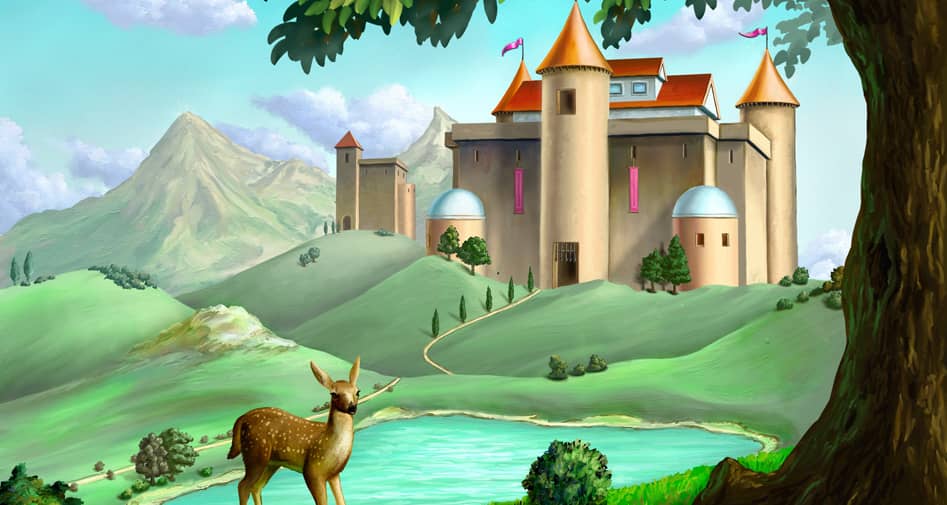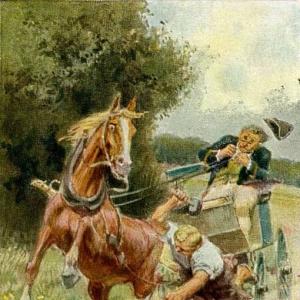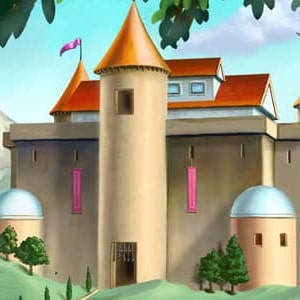Reading time for children: 3 min
Once on a time a poor pious peasant died, and arrived before the gate of heaven. At the same time a very rich, rich lord came there who also wanted to get into heaven. Then Saint Peter came with the key, and opened the door, and let the great man in, but apparently did not see the peasant, and shut the door again. And now the peasant outside, heard how the great man was received in heaven with all kinds of rejoicing, and how they were making music, and singing within. At length all became quiet again, and Saint Peter came and opened the gate of heaven, and let the peasant in. The peasant, however, expected that they would make music and sing when he went in also, but all remained quite quiet. He was received with great affection, it is true, and the angels came to meet him, but no one sang. Then the peasant asked Saint Peter how it was that they did not sing for him as they had done when the rich man went in, and said that it seemed to him that there in heaven things were done with just as much partiality as on earth.
Then said Saint Peter, „By no means, thou art just as dear to us as any one else, and wilt enjoy every heavenly delight that the rich man enjoys, but poor fellows like thee come to heaven every day, but a rich man like this does not come more than once in a hundred years!“
 Learn languages. Double-tap on a word.Learn languages in context with Childstories.org and Deepl.com.
Learn languages. Double-tap on a word.Learn languages in context with Childstories.org and Deepl.com.Backgrounds
Interpretations
Adaptions
Summary
Linguistics
„The Peasant in Heaven“ is a lesser-known fairy tale collected by the Brothers Grimm, Jacob (1785-1863) and Wilhelm Grimm (1786-1859), two German scholars, linguists, and cultural researchers. The Brothers Grimm are best known for their work in collecting and publishing German folklore and traditional stories, which they did as part of a broader effort to preserve and promote German culture.
Their most famous collection, „Kinder- und Hausmärchen“ (Children’s and Household Tales), was first published in 1812 and contains many of the world’s most well-known fairy tales, such as „Cinderella,“ „Snow White,“ „Little Red Riding Hood,“ and „Hansel and Gretel.“ Over the years, the collection went through multiple revisions and expansions, ultimately comprising over 200 stories.
The fairy tales collected by the Brothers Grimm often explore themes of morality, justice, and social norms, featuring characters from various social backgrounds, including peasants, nobles, and magical creatures. „The Peasant in Heaven“ is a prime example of a story that offers a moral lesson and invites readers to reflect on issues of social hierarchy, wealth, and the values that ultimately determine one’s worth in the afterlife.
It is essential to note that the tales collected by the Brothers Grimm were not initially intended for children, but rather for adults and scholars interested in folklore and cultural studies. However, over time, these stories have been adapted and sanitized for younger audiences, becoming staples of children’s literature and inspiring countless adaptations in various forms of media.
„The Peasant in Heaven“ can be interpreted in several ways, highlighting different themes and messages. Some of the key interpretations include.
Equality in the afterlife: One possible interpretation is that the story emphasizes the ultimate equality that exists in the afterlife. Despite the differences in social status and wealth on Earth, both the rich man and the peasant are equally valued and enjoy the same heavenly delights. This can be seen as a reminder that material possessions and status have no bearing on one’s worthiness or happiness in the afterlife.
The rarity of a rich man in heaven: Another interpretation focuses on the fact that poor, pious individuals are more commonly found in heaven than the rich. This may suggest that it is challenging for the wealthy to maintain their piety and stay on the righteous path, possibly because of the temptations and distractions that come with wealth. This idea aligns with biblical teachings, such as the famous saying, „It is easier for a camel to go through the eye of a needle than for a rich man to enter the kingdom of God.“
Challenging social hierarchies: The story also highlights the peasant’s expectation that he would be treated with partiality in heaven, just as he was on Earth. This could be interpreted as a critique of social hierarchies and the unfair treatment of the poor. By showing that both the rich man and the peasant are equally valued in heaven, the story challenges the notion that one’s social standing on Earth reflects their true worth.
A reminder of humility: The tale can also serve as a reminder to stay humble and not to expect recognition or praise for one’s good deeds or piety. The peasant’s disappointment with the lack of fanfare upon his arrival in heaven may suggest that he, too, had succumbed to the desire for recognition. The story encourages readers to focus on the genuine rewards of living a pious life rather than seeking external validation.
Overall, „The Peasant in Heaven“ offers multiple interpretations that emphasize themes of equality, the potential pitfalls of wealth, the importance of humility, and the challenge of social hierarchies.
„The Peasant in Heaven“ is a popular fairy tale that has been adapted in various forms of media over the years. Here are some notable adaptations:
Film Adaptations: One of the most famous film adaptations of „The Peasant in Heaven“ is the 1945 Czech film „The Peasant and the Devil“ directed by Karel Zeman. The film uses the basic plot of the fairy tale but expands on it with new characters and a more complex storyline.
Literary Adaptations: The fairy tale has also been adapted in various works of literature. For example, the French writer Gustave Flaubert wrote a short story called „The Legend of Saint Julian the Hospitaller“ in which the main character has a vision of heaven similar to that of the peasant in the fairy tale. The fairy tale has also been adapted in modern retellings, such as „The Peasant and the Prince“ by Marianne Hering and Nancy I. Sanders.
Musical Adaptations: „The Peasant in Heaven“ has also been adapted in various musical forms, such as operas and musicals. For example, the Italian composer Antonio Salieri wrote an opera called „La Locandiera“ which features a character who has a dream of heaven similar to that of the peasant in the fairy tale.
Television Adaptations: The fairy tale has also been adapted in various television shows and series. For example, the British TV show „The Storyteller“ featured an episode called „The Luck Child“ which was based on the fairy tale. The episode was directed by Jim Henson and featured puppetry and special effects.
Overall, „The Peasant in Heaven“ has proven to be a popular and enduring fairy tale that continues to inspire adaptations in various forms of media.
„The Peasant in Heaven“ is a fairy tale by the Brothers Grimm that tells the story of a poor, pious peasant who arrives at the gates of heaven alongside a very rich lord. Saint Peter, who holds the key to heaven, opens the gate and ushers the rich lord inside while seemingly ignoring the peasant. The peasant overhears the great reception and celebration, complete with music and singing, that the rich lord receives upon entering heaven.
After a while, Saint Peter returns and allows the peasant to enter heaven. The peasant anticipates a similar grand reception, but instead, he is greeted with only silence. While the angels receive him warmly, there is no music or singing to mark his arrival. Confused and disappointed, the peasant questions Saint Peter about the apparent favoritism and partiality shown towards the rich lord.
Saint Peter reassures the peasant that he is just as valued and will enjoy the same heavenly delights as the rich lord. He explains that the reason for the difference in receptions is that poor individuals like the peasant enter heaven frequently, while a rich man’s arrival is a rare event, happening only once in a hundred years.
The fairy tale „The Peasant in Heaven“ by the Brothers Grimm offers a context ripe for linguistic and thematic analysis. This story highlights the juxtaposition between class distinctions on Earth and in the afterlife, subtly critiqued through narrative and dialogue.
Contrastive Language: The language draws a sharp contrast between the „poor pious peasant“ and the „very rich, rich lord. “ The repetition in describing the lord as „rich, rich“ intensifies the socioeconomic difference and foregrounds the story’s theme about wealth and salvation.
Religious and Moral Undertones: Words like „pious,“ „heaven,“ and „Saint Peter“ place the narrative within a religious framework, drawing on Christian moral values. The expectations of music and singing relate to heavenly rewards for a morally good life.
Speech and Direct Dialogue: The use of direct dialogue, particularly Saint Peter’s explanation, serves a didactic purpose, providing a moral lesson directly from an authoritative figure. This represents a typical narrative device in fairy tales, where characters often serve as mouthpieces for moral or ethical teachings.
Simplicity and Accessibility: The language in the tale is straightforward, employing a narrative style that makes it accessible to a wide audience. This simplicity is characteristic of the Brothers Grimm’s tales, ensuring that the moral lessons are clear and easily understood.
Thematic Analysis
Divine Justice and Equality: The tale explores the theme of divine justice, suggesting that all are equal in the eyes of heaven. The peasants’ everyday arrival versus the rare admittance of the rich highlights a reversal of earthly values, where wealth does not equal spiritual worth.
Expectations versus Reality: The peasant’s expectation of music and celebration mirrors earthly notions of merit based on social standing and wealth. His realization, guided by Saint Peter, reveals the folly of such expectations in the divine realm.
Critique of Social Inequality: The story critiques social inequality by validating the worth of the common man („poor fellows like thee come to heaven every day“). It subtly challenges the reader to reconsider the alignment of social status with moral worthiness.
The Rarity of Virtuous Wealth: Saint Peter’s remark about the rarity of rich men’s entry to heaven suggests commentary on the perceived moral challenges associated with wealth, a common theme in folklore, which reflects societal attitudes during the Grimms’ time.
Conclusion
„The Peasant in Heaven“ serves as a microcosm of broader societal values and criticisms. Using straightforward language and clear contrasts, it quietly upends societal norms, suggesting that spiritual worth transcends earthly wealth. This critique, couched in a simple narrative structure, allows for reflection on moral and ethical dynamics often encountered in both historical and contemporary contexts.
Information for scientific analysis
Fairy tale statistics | Value |
|---|---|
| Number | KHM 167 |
| Aarne-Thompson-Uther-Index | ATU Typ 802 |
| Translations | DE, EN, DA, ES, FR, PT, IT, JA, NL, PL, RU, TR, VI, ZH |
| Readability Index by Björnsson | 37 |
| Flesch-Reading-Ease Index | 70.9 |
| Flesch–Kincaid Grade-Level | 10.4 |
| Gunning Fog Index | 12.8 |
| Coleman–Liau Index | 7.6 |
| SMOG Index | 9 |
| Automated Readability Index | 11.5 |
| Character Count | 1.316 |
| Letter Count | 1.018 |
| Sentence Count | 9 |
| Word Count | 256 |
| Average Words per Sentence | 28,44 |
| Words with more than 6 letters | 22 |
| Percentage of long words | 8.6% |
| Number of Syllables | 324 |
| Average Syllables per Word | 1,27 |
| Words with three Syllables | 9 |
| Percentage Words with three Syllables | 3.5% |
















